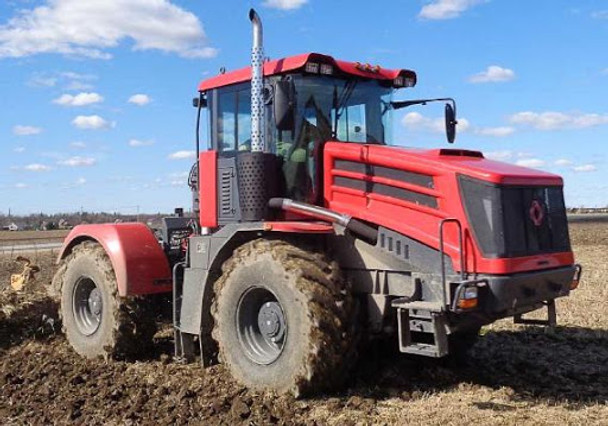Agricultural Machinery Innovations: Boosting Farm Productivity in Nigeria
Key Takeaway
- Increased Efficiency: Innovative agricultural machinery reduces labor time and enhances operational efficiency, allowing farmers to cultivate larger areas in shorter periods.
- Improved Crop Yields: The use of precision farming equipment and technology leads to better resource management, resulting in higher crop yields and improved food security.
- Cost Reduction: Advanced machinery minimizes input costs, such as labor and fuel, contributing to increased profitability for farmers and a more sustainable agricultural sector.
Introduction
Agriculture is a cornerstone of Nigeria's economy, contributing significantly to GDP and employing a large portion of the population. However, despite its potential, the agricultural sector faces numerous challenges, including low productivity, outdated farming techniques, and inadequate access to modern technology. As the demand for food rises with the growing population, there is an urgent need for innovations that can enhance farm productivity. Agricultural machinery innovations have emerged as a crucial solution to these challenges, helping farmers maximize efficiency, reduce labor costs, and improve crop yields.
Agricultural Tractor K-424 Kirovets
Current State of Agricultural Machinery in Nigeria
Many Nigerian farmers still rely on traditional farming methods, which often include manual labor and simple tools. These practices, while sustainable in some contexts, are typically inefficient and labor-intensive. Traditional methods can limit farmers' ability to scale operations and compete in both local and international markets.
Types of Machinery Currently in Use
In recent years, there has been a gradual shift towards mechanization in Nigerian agriculture. The most common types of Agricultural machinery includes:
1. Tractors: These powerful machines play a vital role in preparing land for planting, plowing, and transporting goods. However, their availability is often limited, particularly in rural areas.
2. Planters: Modern planters automate the seeding process, ensuring that seeds are planted at optimal depths and spacing. This precision can significantly improve germination rates and overall crop health.
3. Harvesters: Harvesting machines help reduce the time and labor required to gather crops, minimizing post-harvest losses. Despite their benefits, the adoption of harvesters remains low due to costs and lack of training.
Limitations of Existing Machinery
While some farmers have started using modern machinery, many still face significant limitations. High costs, maintenance issues, and inadequate training prevent widespread adoption. Additionally, many rural areas lack the necessary infrastructure, such as roads and storage facilities, to support efficient machinery use.
Innovations in Agricultural Machinery
Technological Advancements in Agricultural Machinery
Innovations in agricultural machinery are transforming the landscape of farming in Nigeria. These advancements focus on enhancing efficiency, sustainability, and productivity.
1. Precision Agriculture Tools: Utilizing technology such as GPS and data analytics, precision agriculture tools allow farmers to monitor soil conditions, weather patterns, and crop health. This information enables targeted interventions that optimize input use and increase yields.
2. Automated Machinery and Robotics: Robotics in agriculture, including automated tractors and drones, are gaining traction. These machines can perform tasks like planting and monitoring crops with minimal human intervention, saving time and labor.
3. Sustainable Energy-Powered Equipment: The shift towards sustainable energy sources, such as solar-powered machinery, is crucial for reducing reliance on fossil fuels and minimizing environmental impact. These innovations not only help in reducing operational costs but also support sustainable farming practices.
HONDA BRUSH CUTTER
Case Studies of Successful Innovations
Several local manufacturers and startups are making significant contributions to agricultural machinery innovations in Nigeria. For example:
1. Local Manufacturers: Companies are developing affordable, locally-made tractors and other machinery tailored to the specific needs of Nigerian farmers. These innovations often come with better support and maintenance options, increasing farmers' trust and adoption rates.
2. International Partnerships: Collaborations with international agricultural machinery firms have brought advanced technologies to Nigeria, providing access to cutting-edge equipment and expertise. Such partnerships are essential for knowledge transfer and local adaptation of technologies.
Impact of Agricultural Machinery Innovations on Farm Productivity
1. Increased Efficiency in Farming Operations
The introduction of modern machinery has drastically improved the efficiency of farming operations. Farmers can now complete tasks such as tilling, planting, and harvesting much faster than before. For instance, a tractor can plow several acres in a fraction of the time it would take a farmer using traditional methods. This increased efficiency allows farmers to allocate time and resources to other critical aspects of their operations, such as crop management and marketing.
2. Reduction of Labor Costs
Labor costs in agriculture can be significant, especially during peak planting and harvesting seasons. By adopting machinery, farmers can reduce their dependence on manual labor, which not only lowers costs but also mitigates the risk of labor shortages. For example, a single harvester can replace the work of dozens of laborers, enabling farmers to manage larger areas of land with fewer resources.
3. Enhanced Crop Yields and Quality
With the precision offered by modern machinery, farmers can optimize planting conditions and inputs, leading to improved crop yields and quality. For instance, precision planters ensure that seeds are sown at the correct depth and spacing, promoting better growth and minimizing competition among plants. Additionally, modern harvesting techniques help preserve the quality of crops, reducing losses due to spoilage or damage.
4. Improved Resource Management (Water, Fertilizers)
Innovative agricultural machinery often incorporates advanced technologies that enhance resource management. For example, drip irrigation systems integrated with automated sensors can optimize water usage, ensuring crops receive the right amount of water without wastage. Similarly, machinery that accurately applies fertilizers based on soil conditions reduces excess usage, leading to cost savings and minimizing environmental impact.
Honda Rotary Tiller 5.5 hp FQ650
Challenges to Implementing Machinery Innovations
1. High Initial Costs and Financing Issues
One of the most significant barriers to adopting agricultural machinery innovations in Nigeria is the high initial cost. Many smallholder farmers lack access to credit and financing options, making it difficult to invest in modern equipment. While the long-term benefits can outweigh the initial investment, the upfront costs remain a substantial hurdle.
2. Lack of Training and Technical Support for Farmers
Even when farmers can acquire new machinery, a lack of training can hinder their effective use. Many farmers may be unfamiliar with modern equipment and technologies, leading to underutilization or improper use. Establishing training programs and technical support services is crucial to empower farmers and maximize the benefits of agricultural machinery innovations.
3. Infrastructure Challenges (Roads, Storage, etc.)
Infrastructure issues, such as poor road networks and inadequate storage facilities, pose additional challenges to implementing machinery innovations. Accessing markets can be difficult when roads are impassable, and without proper storage, harvested crops may spoil before reaching consumers. Investing in rural infrastructure is essential for supporting agricultural productivity.
4. Socio-Economic Factors Affecting Adoption
Social and economic factors also play a significant role in the adoption of agricultural innovations. Factors such as cultural attitudes toward modern farming, gender disparities in access to resources, and the level of education among farmers can all influence the uptake of new technologies. Addressing these issues through inclusive policies and community engagement is vital for promoting innovation.
Government and Policy Support
1. Overview of Existing Agricultural Policies
The Nigerian government has recognized the importance of agriculture and has implemented various policies to support the sector. These policies aim to improve food security, enhance productivity, and promote the adoption of modern farming practices. However, the effectiveness of these policies can vary, and more focused efforts are needed to encourage machinery adoption.
2. Government Incentives for Machinery Adoption
To stimulate the use of modern agricultural machinery, the government can provide incentives such as subsidies, tax breaks, and low-interest loans for farmers. Such initiatives can help lower the financial barriers to accessing machinery, encouraging more farmers to invest in technology.
3. Role of NGOs and International Organizations in Supporting Farmers
Non-governmental organizations (NGOs) and international organizations play a critical role in supporting farmers through training, access to resources, and funding. By partnering with local communities, these organizations can facilitate the adoption of machinery innovations, ensuring that farmers have the necessary support to succeed.
Soil moisture AIK-TPH01803 Hellog
Future Trends in Agricultural Machinery
1. Emerging Technologies (AI, IoT, Drones)
The future of agricultural machinery in Nigeria will likely be shaped by emerging technologies such as artificial intelligence (AI), the Internet of Things (IoT), and drones. AI can optimize farming practices by analyzing data from various sources, enabling farmers to make informed decisions about planting, pest control, and resource allocation. Drones equipped with imaging technology can monitor crop health, assess land conditions, and even assist in planting seeds in hard-to-reach areas, thereby enhancing productivity.
2. Potential for Local Innovation and Production
There is significant potential for local innovation in agricultural machinery manufacturing. By investing in research and development, Nigeria can create machinery tailored to the unique challenges faced by its farmers. Supporting local manufacturers can lead to job creation, skill development, and reduced reliance on imported machinery, fostering a more resilient agricultural sector.
3. Predictions for the Agricultural Landscape in Nigeria
As technological advancements continue to unfold, the agricultural landscape in Nigeria is set for transformation. Increased adoption of machinery will likely lead to higher productivity levels, improved food security, and enhanced economic stability. By embracing these innovations, Nigeria can position itself as a leader in agricultural development in Africa.
2 Rows Vegetable Seeder Manual Seed Planter
Frequently Asked Questions
1. What are the main types of agricultural machinery used in Nigeria?
The main types include tractors, planters, and harvesters. These machines help automate tasks, improve efficiency, and increase crop yields.
2. How can farmers finance the purchase of agricultural machinery?
Farmers can explore government subsidies, low-interest loans, and financing options provided by NGOs or agricultural cooperatives to help cover the costs.
3. What are the benefits of precision agriculture tools?
Precision agriculture tools enhance resource management, optimize input use, and improve crop health, leading to better yields and reduced waste.
4. How do emerging technologies like drones and AI improve farming?
Drones can monitor crop health and assist in planting, while AI analyzes data to optimize farming practices, leading to more efficient operations.
5. What role does the government play in supporting agricultural machinery adoption?
The government can provide incentives, implement supportive policies, and invest in rural infrastructure to facilitate the adoption of modern machinery by farmers.
Related Article
What are Agricultural Machinery
Conclusion
Agricultural machinery innovations are crucial for boosting farm productivity in Nigeria. While challenges remain, the potential benefits of increased efficiency, reduced labor costs, and enhanced crop yields are significant. With appropriate support from the government, NGOs, and local communities, Nigeria can harness these innovations to transform its agricultural sector and ensure sustainable food production for the future.
To boost your farm's productivity and stay ahead in the agricultural landscape, consider exploring innovative machinery solutions. GZ Industrial Supplies offers a wide range of agricultural equipment designed to meet the needs of Nigerian farmers. Visit GZ Industrial Supplies today to learn more about how we can help you enhance your farming operations!












